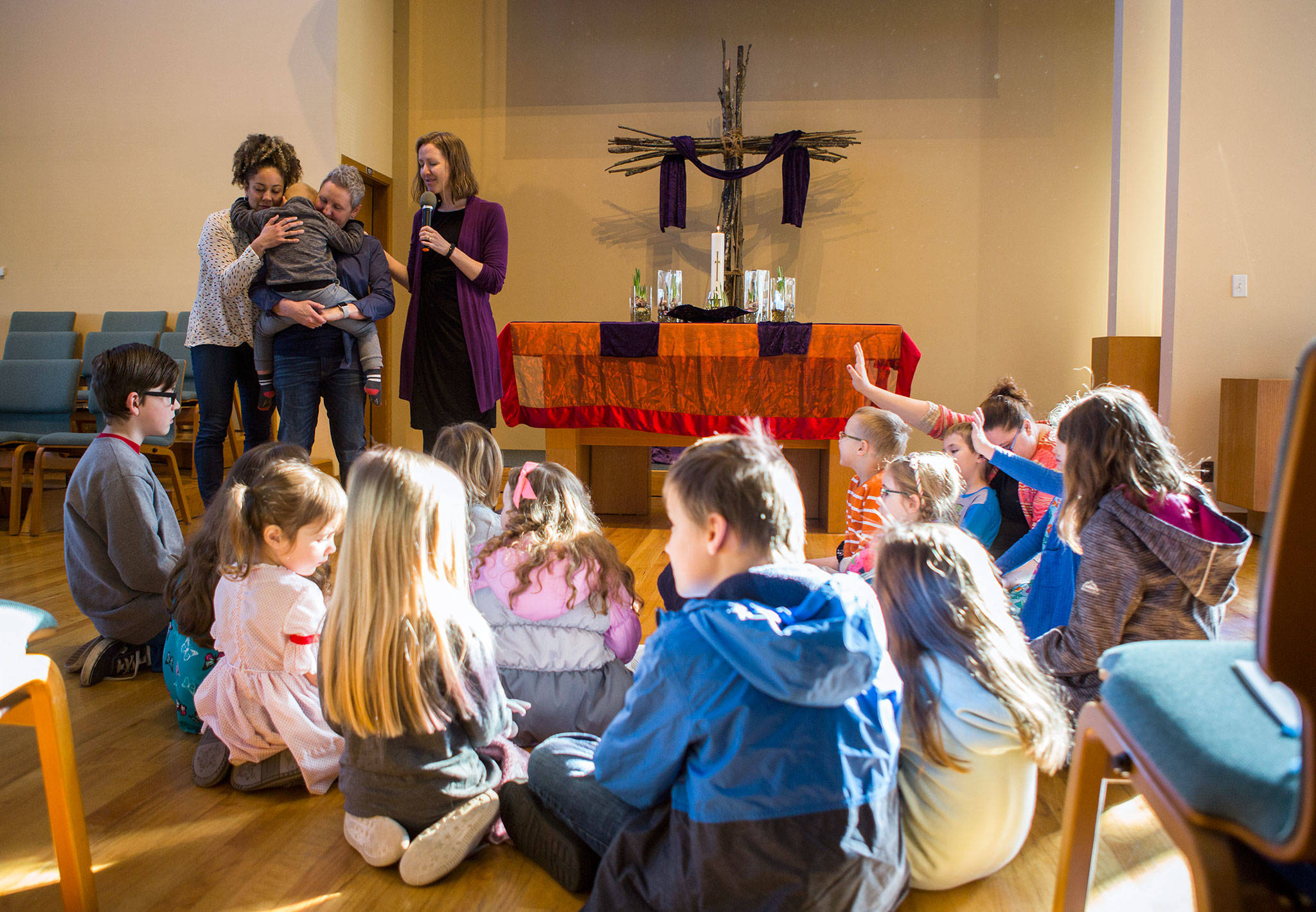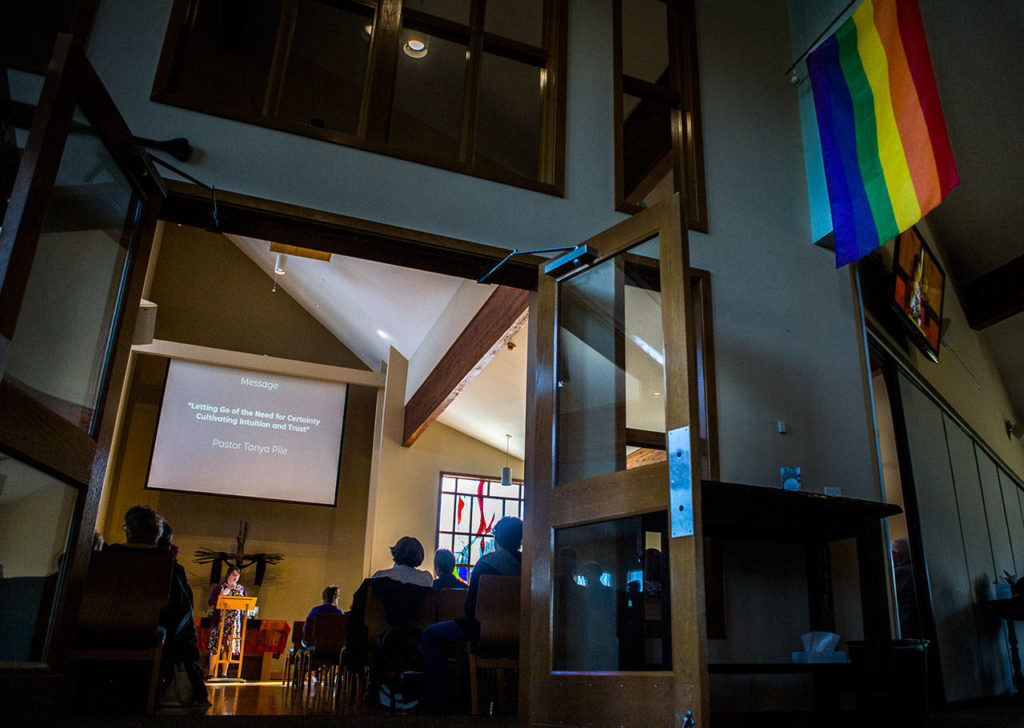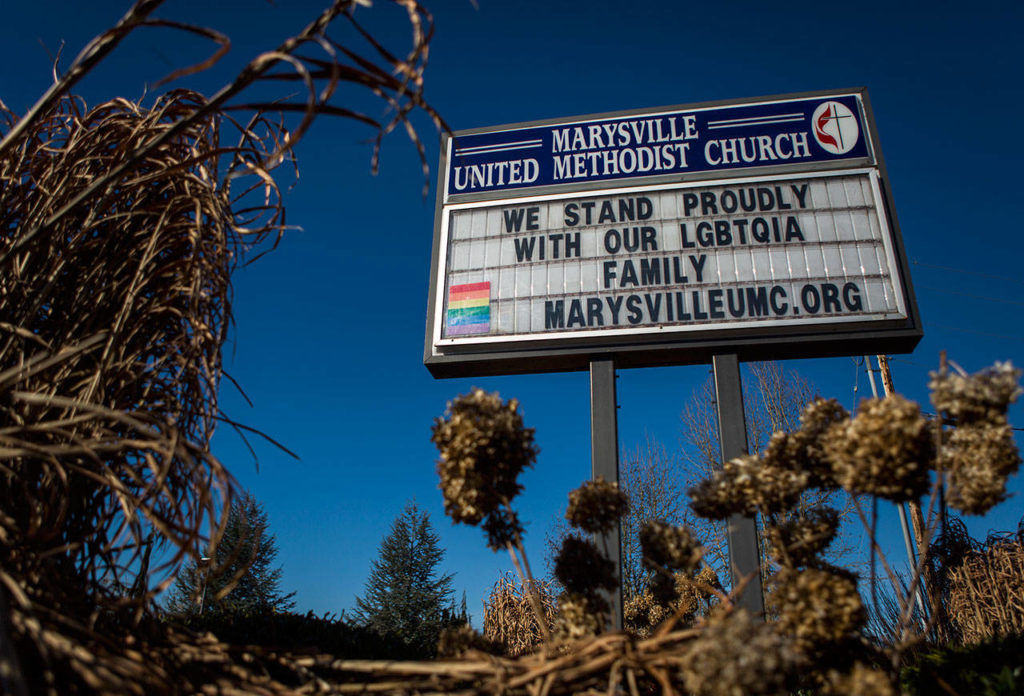MARYSVILLE — Those who arrived at the Marysville United Methodist Church last week were greeted by a sign reading “We stand proudly with our LGBTQIA family.”
Rainbow-painted curbs line the way to the church’s entrance.
These signals of support may come as a surprise after news late February that global Methodist church leaders voted to strengthen the faith’s bans on same-sex marriage and ordination of LGBTQ clergy.
But locally, several Methodist congregations have a different message.
“The roots of acceptance are deep,” said Barb Warren. She and her partner have been attending the Marysville United Methodist Church for seven years.
“From the moment we walked in, (my partner) and I were completely accepted,” she said. “No questions asked. We didn’t have to explain anything.”
Warren, 76, said she grew up in a conservative church and was married to a man until she was 52. After their divorce, she began dating her current partner.
They’ve now been together 23 years. They got married at Seattle City Hall the day same-sex unions were legalized in Washington in 2012. About 122 couples wed that day, she recalled.
“It felt important to commemorate for all those who passed away before they were able to get married,” Warren said.
The couple didn’t officially become members of Marysville United Methodist until 2015 when the church voted to formally become an inclusive “reconciling congregation.”
About 94 percent of the congregation supported the designation, she said.
The Rev. Jenny Smith, lead pastor at Marysville Methodist, said the global church’s February vote came as a surprise.
There had been signs a more progressive plan would pass.
“We’re so heartbroken over this,” Smith said. “It’s not representative of what’s going on here in Marysville.”
Questions about the church’s stance on LGBTQ issues have been at the center of the United Methodist denomination’s general conferences —held every four years — since the 1970s, said Tanya Pile, associate pastor at Marysville Methodist.
Last month’s assembly was a special meeting dedicated exclusively to debating human sexuality.
“They couldn’t get anything done because everything kept coming back to the issue of LGBT inclusivity,” Pile said.
The “Traditional Plan” was approved by a vote of 438-384, according to The Associated Press.
The plan calls for clergy who perform same-sex marriages to face consequences from the denomination, Smith said. It also proposes more stringent rules against the ordination of LGBTQ church leaders.
Methodist congregations in the greater Northwest area have a history of stepping outside the global church’s rule book, the “Book of Discipline,” as an act of defiance, Smith said.
There are three reconciling Methodist congregations in Snohomish County including Marysville, according to the Reconciling Ministries Network website.
In a statement released shortly after the ruling, the United Methodist Church’s regional Bishop of the Greater Northwest Elaine Stanovsky expressed disappointment in the vote.
“I don’t intend to lead us backward,” she wrote. “We have come too far together to turn back now.”
Portions of the global church’s Traditional Plan may still be deemed unconstitutional by Methodist leadership, Smith said. Whatever the outcome, she said Marysville United Methodist won’t heed the ruling.
Warren was equally adamant the global church’s ruling doesn’t reflect the congregation she’s a part of.
“Nothing changes here,” she said.
With its global reach, the Methodist denomination has the numbers and resources to make a real impact, Smith said.
“A lot of good can be done when 12 million people all put their money toward something like malaria prevention,” she said.
But it also means communities with wildly different perspectives must abide by the same set of rules.
Rev. Jim Clarke, pastor at Cedar Cross United Methodist Church in Mill Creek, said he believes last month’s vote would have turned out differently if it had been a U.S. vote.
“The way I look at it, it’s a clash between two very good values,” he said. “One is to be a global church and include people outside the U.S. in big decisions. Being inclusive is equally about being inclusive of LGBT people.”
Clarke’s church voted 184-4 to become an reconciling church in 2013.
In Snohomish, Rev. Janelle Kurtz said her congregation is grappling with what to do next.
“There’s a lot of ‘stay and fight’ because we don’t think this is just,” she said. “And some people are saying justice means starting something brand new because we can’t be affiliated with something that’s doing harm.”
Smith said Methodists are generally falling into one of those two camps — stay and fight for LGBTQ rights, or start something new.
Pile, associate pastor at Marysville Methodist, said she’s an advocate for staying with the Methodist denomination and continuing to push for being inclusive.
“I think it’s easier to have a voice from inside than shouting in from outside,” she said. “If I want to make a change, if I want something to come from it, I think I need to fight for it from the inside.”
Right now, strengthened bans on same-sex marriage and ordination of LGBTQ clergy “are just talk,” Warren said.
But if the denomination enforces the new standards within traditionally defiant western churches, she would support splitting off.
In practice, separating from the overarching Methodist church could prove difficult for a local church, Clarke said.
An individual congregation owns its property as long as it is part of the United Methodist Church. If it breaks off, the denomination gets the land.
There are many unanswered questions, Warren said. But her church’s mission — to love every person who walks in its doors — will remain unchanged.
“Whether you’re 20 or 80, you need to know if there is a safe place to be yourself or find yourself,” she said.
Julia-Grace Sanders: 425-339-3439; jgsanders@heraldnet.com.
Talk to us
> Give us your news tips.
> Send us a letter to the editor.
> More Herald contact information.



























